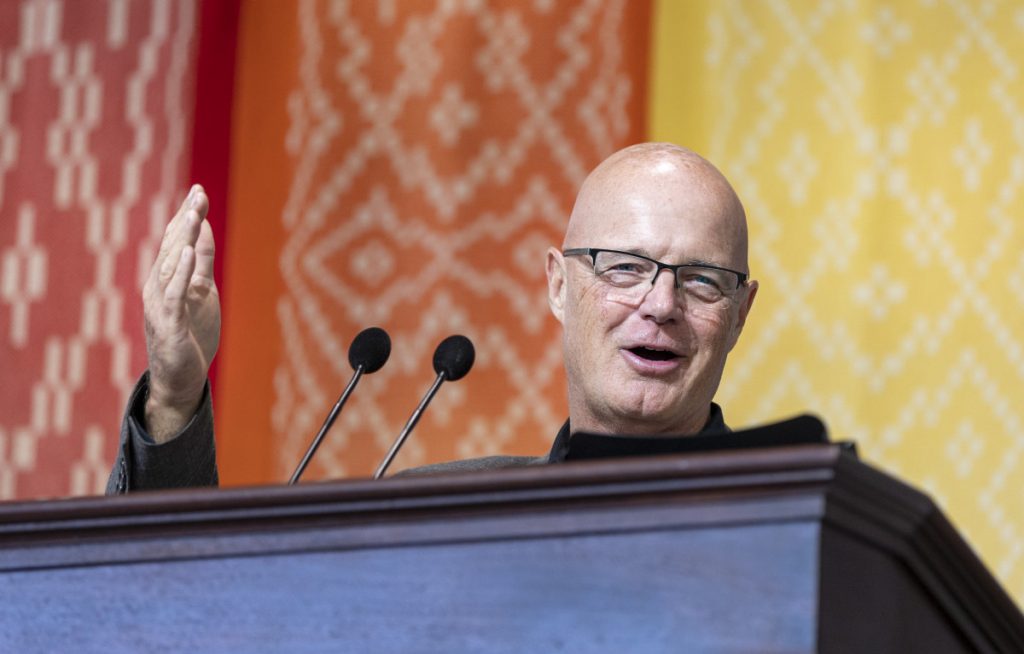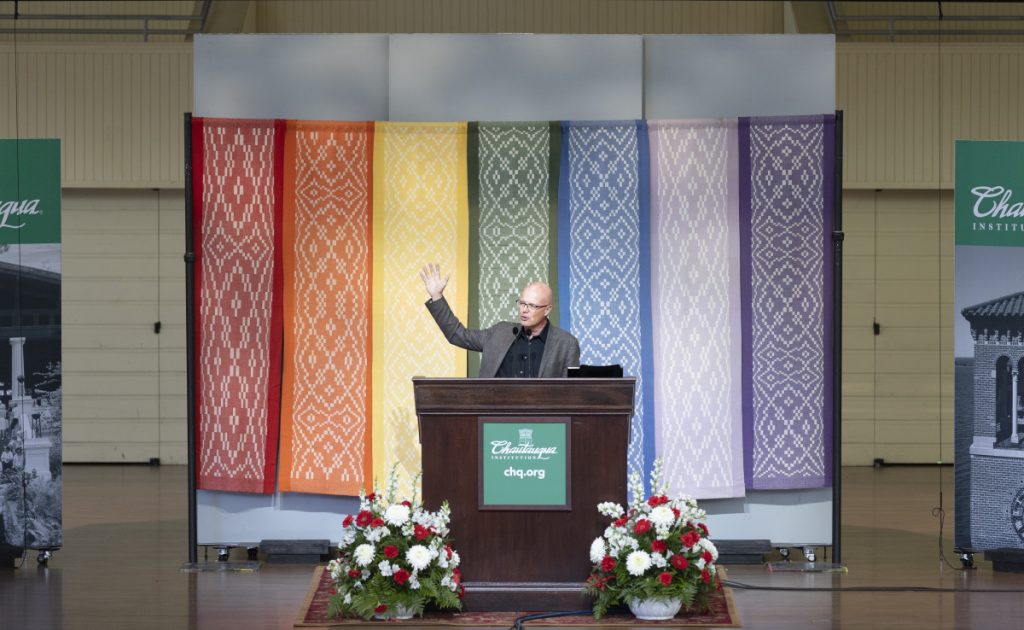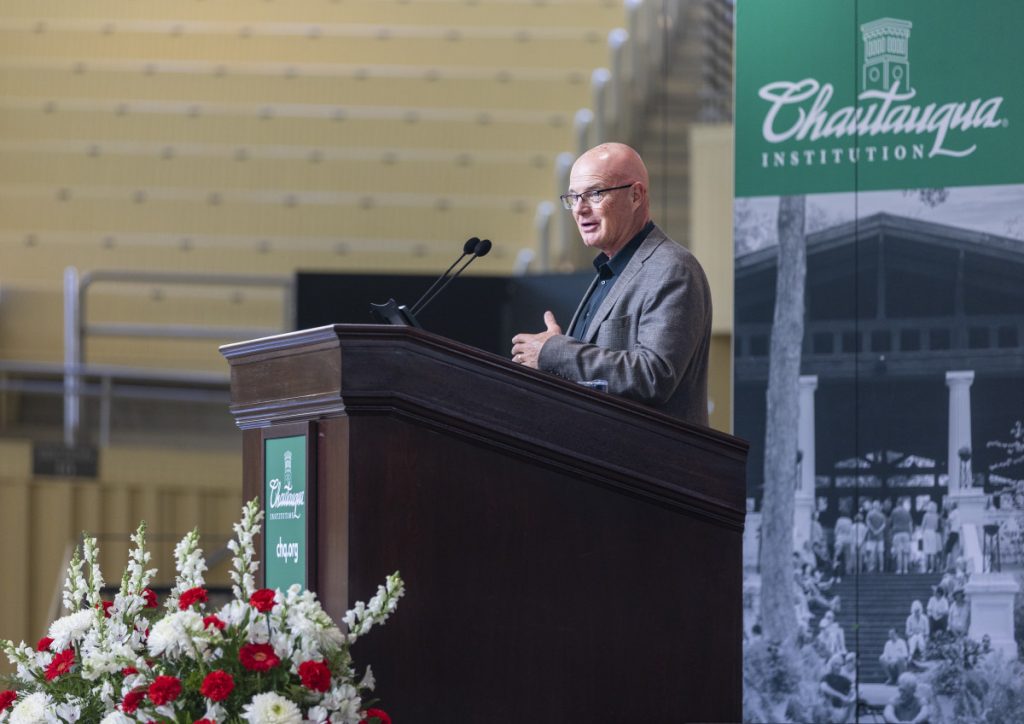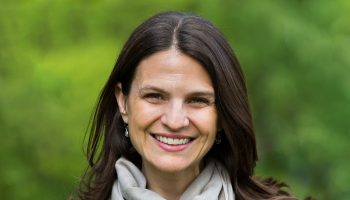MAX ZAMBRANO – STAFF WRITER

Brian McLaren was miles down a remote fishing trail in Pennsylvania when he heard a call. A few, actually, each time becoming more clear the call was his name.
“If anyone had gone through that much trouble to find me way, way back in this remote valley, it had to be bad news,” he said.
McLaren was a 34-year-old pastor at the time, in the early 1990s, on a retreat. He had been experiencing some doubt in his faith. On the two-mile uphill hike back to his car, he could only be sure of his fast-beating heart, and unsure of anything to come.
When he returned to the retreat center, he called his wife.
That morning, their 6-year-old son was looking pale, so she took him to their pediatrician. When the results from a blood draw came, the order was strict: Get him to the hospital within the hour.
McLaren immediately began driving five hours south to the hospital.
“All I could think of was my precious little boy,” he said. “How much I loved him. How I would gladly trade places with him. My heart was also broken for my wife, who was having to handle this alone. Truth be told, I was more than a little bit worried about myself. I was already struggling. I was worn down. I was grappling with a crisis of faith.”
Through several rounds of tears and prayers, McLaren arrived at his new reality, one of bone marrow, spinal infusions and five-year survival rates. His son, Trevor, had acute lymphocytic leukemia.
For months, he and his wife traded places at the hospital — they had three other children and jobs — rarely seeing each other besides the tag-outs. One day, when he was home alone, finally with a chance to pause, McLaren read through a newsletter from an organization that supported parents of kids with cancer.
On the second-to-last page was a list. On it, the names of children who had passed away in the previous month. Next to their names were their parents’ names. McLaren was struck.
“I began to feel my own pain,” he said, “the pain that in some ways I didn’t have time to feel in the rush of the previous months. I felt the threat that had crashed into my son’s life, and into my family’s life. … My pain joined with the pain and the grief of these other parents whose names were on that page.”
McLaren felt their pain as if it was his own. Indeed, it was his own pain, he said.
“It was as close as if there was this one huge ocean of pain out here, and I had just sailed down my river and entered into it,” he said. “Each of those names of a lost child was as dear to those parents on that page as Trevor was to me.”
He mourned each family’s loss of birthdays, graduations, weddings, careers and life, he said. His empathy was spreading uncontrollably, like the waves that spread from a rock that just splashed in water, he said. The experience, to him, was breathtaking and profound.
“The feeling was pure,” he said. “So pure. I would even use the word ‘holy’ to describe it.”
McLaren read the poem “What They Did Yesterday Afternoon,” by Warsan Shire. Shire was born in Kenya and raised in England. In the poem, Shire writes of her aunt’s house set ablaze, and how she prayed for her two countries. One was thirsty, the other was on fire, and both needed water, she wrote.
“later that night / i held an atlas in my lap / ran my fingers across the whole world / and whispered / where does it hurt? / it answered / everywhere / everywhere / everywhere,” Shire wrote.

McLaren further described this experience and the importance of empathy in his Interfaith Lecture at 1 p.m. Monday in the Amphitheater. His lecture, “Studios of Empathy: Why, What, and How?” was the first of three Week Six lectures themed “Building a Culture of Empathy.”
Empathy is like a radar dish, McLaren said. It’s turned inward at birth, helping people understand when their diaper needs changed or when they’re hungry. As one grows up, the radar becomes more sensitive and begins focusing outside of oneself.
For some, it’s focused just on their nuclear family. For others, it may include an extended family, neighbors, members of the same race, political party or nation, he said. For others still, it detects the feelings of strangers, and even others are empathetic to other species.
Psychologists analyze empathy in cognitive, or intellectual, dimensions and affective, or emotional, dimensions.
“Cognitively, empathy involves the ability to understand perspective, to understand that what is a win for you could be a loss for somebody else or vice versa,” McLaren said. “Empathy involves personal connection, the ability to feel something that another person feels, and it also involves personal distress — how hurt, motivated or incapacitated you are by someone else’s pain.”
Without distress, McLaren said, empathy will fade away from consciousness like static electricity. Too much distress, however, can paralyze a person. If someone on a crime scene faints at the sight of blood, they are another casualty, he said.
“That’s why psychologists say healthy empathy means being able to imagine what life is like in someone else’s shoes, yet staying in your own shoes,” he said. “It means being touched by others’ pain, but not being hopelessly and helplessly absorbed into it.”
When someone can strike that balance, they can act constructively, creating a more sustainable and habitual pattern.
“It becomes a part of who you are,” he said.
McLaren battled doubt in his faith. His son battled leukemia. Both survived, but are forever changed.
“He didn’t simply go back to being a normal kid,” McLaren said. “It turned him into a philosopher. It gave him a seriousness and a fire to live while he’s alive. Now, in his mid-30s, he’s never lost the ability to let his pain not divert him from the pain of others, but find a connection.”
McLaren understood the doubtful aspects of his religion, Christianity, deserved to be doubted, he said. He felt a moral obligation to challenge and improve it.
“The pain of doubt sensitized me to the cries of the earth, and cries of the poor,” he said. “The cries of the suffering, the misunderstood and the forgotten. It let me hold an atlas on my lap and ask it where it was hurting, and pause and listen for a reply.”
This idea of doubt and deconstruction was apparent in the New Testament, in Matthew 5-7, McLaren said, but he never realized it.
“(Jesus) advocated for taking the empathy that we naturally feel for people who are like us, and who like us, and extending that, without discrimination, to others,” McLaren said.
In this same passage, Jesus tells of the creator’s concern for flowers and birds, he said.
“God feels a pang of sorrow for every sparrow that falls from the sky,” he said. “God cherishes the beauty of a single wildflower that only blooms for one short afternoon.”
McLaren said the country and world today lacks empathy.
“The future of empathy in our culture is not only in question,” he said. “It is in peril.”
Dictators, authoritarians and demagogues know to create hostility against a common enemy in order to build loyalty, even if the enemy doesn’t exist, McLaren said.
“It’s the creation of fear and the invitation to join in enmity against a common enemy that turns a crowd into a mob ready to do anything for that leader,” he said. “In fact, a good definition of an enemy is a human being who has been dehumanized to the point where we feel justified in having no empathy at all.”
Cable news outlets, McLaren said, know that keeping people afraid and in fear boosts their ratings and increases profits. Corporate leaders and economists often believe empathy is a liability instead of an asset, he said. He read an August 2018 tweet from then-Prime Minister of Israel Benjamin Netanyahu.
“The weak crumble, are slaughtered and are erased from history while the strong, for good or ill, survive,” Netanyahu wrote. “The strong are respected, and alliances are made with the strong, and in the end peace is made with the strong.”

McLaren agreed that strength is needed in the world.
“But strength without empathy can make you a real monster,” he said, drawing applause from the Amp crowd. “And a world run by competing monsters is not a world you want to bequeath to your grandchildren.”
In trying to figure out how to develop empathy before it’s too late, one might then question whose job it is to teach such empathy, McLaren said.
“Sadly, the answer is almost no one,” he said.
Politicians are too focused on short-term gains, and businesses prefer profits, he said. Educators might be a good choice, but no standardized test looks at empathy.
“If they did, some politicians would be shouting to defund the schools,” he said.
McLaren believes the true point and highest contribution of religion is to create a culture of empathy, compassion and love. It will take a revolutionary strategy as detailed as the moonshot program in the 1960s, he said.
Movements must begin somewhere, he said. He highlighted important figures such as Pope Francis, Bishop Michael Curry, the Institution’s Vice President of Religion Rt. Rev. V. Gene Robinson, and Tuesday’s Interfaith Lecture Series speaker Edgar Rodriguez.
“Yes, there are many religious leaders who are oblivious and are a part of the problem, but there are many who could become a part of the solution if they just hear our voices raised from today onward,” McLaren said.
Empathy is at the heart of most religions, he said, but he understands that many faith communities will not change.
“They’re never going to turn their radar dish further outside,” he said. “Here’s what I’d say about them: Let them be. Nobody can force them to change until they’re ready, and they’re not ready. I know this: Many of us are ready.”
McLaren called on people to imagine Methodist or Catholic churches where participants were urged to feel the pain inflicted on them and that they inflicted on others. Or to imagine a synagogue, mosque or Southern Baptist gathering where participants were urged to feel a connection to strangers just as they would to their own family, because they, too, are someone’s family.
He said to imagine congregations understanding compassion fatigue and the need for retreats, and to understand their inherited religious narratives can constrict empathy and increase hostility.
There are a few steps to reaching such imaginations, he said. First is bringing together thought leaders and content creators to create resources, train trainers and network across religions, he said.
“Build it from the grassroots,” he said. “Look for the green grass on both sides of every religious fence.”
He said to provide resources through all necessary means and to give encouragement to local leaders to innovate. Leaders should come together to share best practices within their religious groups and across religious groups, he said.
“Expect strong opposition from gatekeepers,” he said. “Empathize even with them. But do not be intimidated. Use each criticism as an opportunity to clarify your message for those who are open.”
Lastly, he said to focus efforts on parents teaching children, so they will teach their peers and create youth leaders.
“If you take an atlas tonight, and hold it in your lap, and you run your fingers across the whole world, yes, everywhere you will hear cries of pain,” he said. “But, if you listen, you will also hear something else that’s everywhere.”
This sound will be the song of those opening their pain and empathy for the world, he said.
“It might be today … you dare to open your heart to an empathy that is so big and so pure, that you might even call it holy,” he said.




